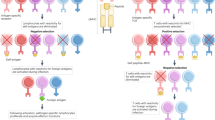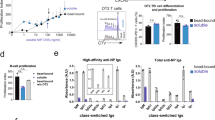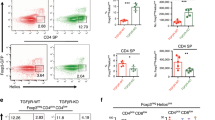Abstract
Thymus-derived (T) lymphocytes using the αβ T-cell antigen receptor (TCR) recognize fragmented antigen in conjunction with surface molecules encoded by genes of the major histocompatibility complex (MHC)1–6. Peripheral T lymphocytes preferentially see antigen presented by self rather than by foreign MHC molecules7–9, and autoreactive T lymphocytes are deleted10. Thus, the peripheral T-lymphocyte repertoire is skewed towards recogni-tion of antigen in the context of self-MHC and towards tolerance to self-antigens. During T-lymphocyte development in the thymus, this repertoire is formed by the interaction of TCR with MHC molecules resulting in positive and negative selection phenomena7–10. Hybrid antibodies (HAbs) that carry binding sites to the TCR and to a surface marker on another cell can engage all T lymphocytes regardless of their specificity11. It should be possible to mimic selection processes in normal animals with HAb that specifically link members of a TCR family to MHC molecules on the thymic stroma. We have probed T-lymphocyte development with HAbs linking Vβ8 positive TCR to either class I or class II MHC products in thymic organ culture. Thymocytes exposed to either HAb in an early stage of maturation respond with a sig-nificant increase in the frequency of Vβ8 carrying cells. At a later stage of development Vβ8 positive thymocytes are depleted. These results illustrate the succession of positive and negative selection in the developing thymus of normal mice
This is a preview of subscription content, access via your institution
Access options
Subscribe to this journal
Receive 51 print issues and online access
$199.00 per year
only $3.90 per issue
Buy this article
- Purchase on Springer Link
- Instant access to full article PDF
Prices may be subject to local taxes which are calculated during checkout
Similar content being viewed by others
References
Kindred, B. & Shreffler, D. C. J. Immun. 109, 940–943 (1972).
Katz, D. H., Hamaoko, T. & Benacerraf, B. J. exp. Med. 137, 1405–1418 (1973).
Zinkernagel, R. M. & Doherty, P. C. J. exp. Med. 141, 1427–1436 (1975).
Babbitt, B., Allen, P., Matsueda, G., Haber, E. & Unanue, E. Nature 317, 359–361 (1985).
Schwartz, R. A. A. Rev. Immun. 3, 237–261 (1985).
Townsend, A. R. M., Gotch, F. M. & Davey, J. Cell 42, 457–467 (1985).
Bevan, M. J. Nature 269, 417–419 (1977).
von Boehmer, H., Haas, W. & Jerne, N. K. Proc. natn. Acad. Sci. U.S.A. 75, 2439–2442 (1977).
Zinkernagel, R. & Doherty, P. C. Adv. Immun. 27, 51–77 (1987).
Nossal, G. J. V. A. Rev. Immun. 1, 33–62 (1983).
Staerz, U. D. Kanagawa, O. & Bevan, M. J. Nature 314, 628–631 (1985).
Robinson, J. H. & Owen, J. J. T. Clin. expl. Immun. 23, 347–354 (1976).
Robinson, J. H. & Owen, J. J. T. Clin. expl. Immun. 27, 322–327 (1977).
Kisielow, P., Leiserson, W. & von Boehmer, H. J. Immun. 133, 1117–1123 (1984).
Snodgrass, R. & Keller, G. EMBO J. 6, 3955–3960 (1987).
Kappler, J. W., Roehm, N. & Marrack, P. C. Cell 49, 273–280 (1987).
Kappler, J. W., Staerz, U. D., White, J. L. & Marrack, P. C. Nature 332, 35–40 (1988).
MacDonald, H. R. et al. Nature 332, 40–45 (1988).
Kisielow, P., Blüthmann, H., Staerz, U. D., Steinmetz, M. & von Boehmer, H. Nature 333, 742–746 (1988).
Sharrow, S. O., Mathieson, B. J. & Singer, A. J. Immun. 126, 1327–1335 (1981).
Singer, P. A., McEvilly, R. J., Noonan, D. J., Dixon, F. J. & Theophilopoulos, A. N. Proc. natn. Acad. Sci. U.S.A. 83, 7018–7022 (1986).
Crispe, I. N. et al. Nature 329, 336–339 (1987).
Born, W. et al. J. Immun. 138, 999–1008 (1987).
Staerz, U. D., Rammensee, H.-G., Benedetto, J. & Bevan, M. J. J. Immun. 134, 3994–4000 (1985).
Behlke, M. A. et al. J. exp. Med. 165, 257–262 (1987).
Keller, G., Paige, C., Gilboa, E. & Wagner, E. F. Nature 318, 149–154 (1985).
Staerz, U. D. & Bevan, M. J. Proc. natn. Acad. Sci. U.S.A. 83, 1453–1457 (1986).
Havran, W. L. et al. Nature 330, 170–173 (1987).
Author information
Authors and Affiliations
Rights and permissions
About this article
Cite this article
Zepp, F., Staerz, U. Thymic selection process induced by hybrid antibodies. Nature 336, 473–475 (1988). https://doi.org/10.1038/336473a0
Received:
Accepted:
Issue Date:
DOI: https://doi.org/10.1038/336473a0
This article is cited by
-
Specific inhibition of CD4+ T lymphocytes by a hybrid antibody
Nature Biotechnology (1998)
-
Distinct sequence of negative or positive selection implied by thymocyte T-cell receptor densities
Nature (1990)
-
Correlation between the Vß4+CD8+ T-cell population and theH-2 d haplotype
Immunogenetics (1990)
Comments
By submitting a comment you agree to abide by our Terms and Community Guidelines. If you find something abusive or that does not comply with our terms or guidelines please flag it as inappropriate.



